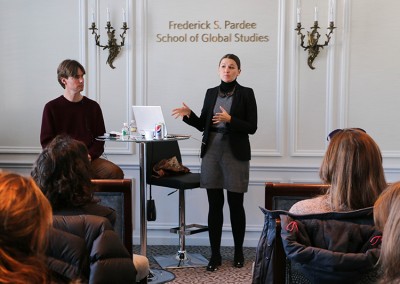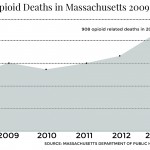
Visiting scholar Katia Vladimirova held a talk Tuesday at Boston University’s Frederick S. Pardee School of Global Studies to emphasize the role moral values play in individual action in addressing climate change and environmental issues.
Vladimirova spoke with moderator Henrik Selin, the associate director of the division of international studies at the Pardee School, about how individuals can look at environmental change from a moral standpoint.
“Philosophers tell us that if we believe that something is virtuous, then it is more likely that we engage into this action with climate change. It is very difficult to say what the right thing to do is,” said Vladmirova, a Ph.D fellow from the Libera Università Internazionale degli Studi Sociali “Guido Carli” in Rome. “We have lots of individual personal norms. At some point, people start developing some shared sense of values.”
Approximately 15 students, faculty and residents were in attendance for the talk.
“There is indeed another way of thinking of climate change other than economics, politics, technology and innovation,” she said. “I believe it’s really important to build a strong moral case in individual actions.”
The sustainability movement has grown among businesses and other companies, but has lacked individual action in fighting climate change, Vladimirova said.
“There’s a movement for sustainable consumption, but lack of concept of individual responsibility for global environmental crisis,” she said. “We don’t feel responsible for an island sinking in the Pacific.”
Vladimirova spoke about the growing awareness surrounding environmental issues and its prominence over time as climate change continues to be backed by scientific evidence.
“The awareness of climate change and scientific proof are very hard to deny at this point,” she said. “It’s not like 40 years ago when things were uncovered and it wasn’t possible to convince many people. It was difficult to convince everyone that this was the problem. Resources are finite on our planet. Everyone has individual responsibilities.”
Following her talk, Vladimirova answered questions from the audience. She emphasized that the beginning of a person’s life is crucial toward building the morals required for a sustainable mindset.
“The first 30 years of your life, a lot depends on upbringing,” she said. “A lot of messages on changing values are directed at young people. Values should change from a consumption society to a more sustainable society.”
Several students in attendance said they found Vladimirova’s findings engaging.
Sarah Dorman, a graduate student at the Pardee School, said she appreciated the cultural aspect of the environmental talk.
“I personally am doing education policy in Africa, and I’m looking at methodology to look at what succeeds and what fails,” she said. “It’s kind of the same mindset here today. I was looking to see what they would talk about to display what’s been happening so far that has helped push us forward as a species and what has held us back.”
Kristin Sippl, a student at the Graduate School of Arts and Sciences studying political science, said the morals discussed during the talk provided an interesting perspective about sustainability.
“One of the things that was really interesting was what makes individuals undergo a value shift,” she said. “One of them was deliberation, having a role model who influences you, and the third one was going through some sort of a disaster situation. That was really interesting and something really concrete that you can take and use as a tool and get your hands around all of this abstract philosophy stuff.”
Sippl said she enjoyed Vladimirova’s philosophy to address current environmental issues.
“I really liked her pluralistic philosophy,” she said. “I liked how she had done a lot of empirical work to underpin this high-level abstract philosophy on how to sell a certain issue in Russia or in the United States.”




